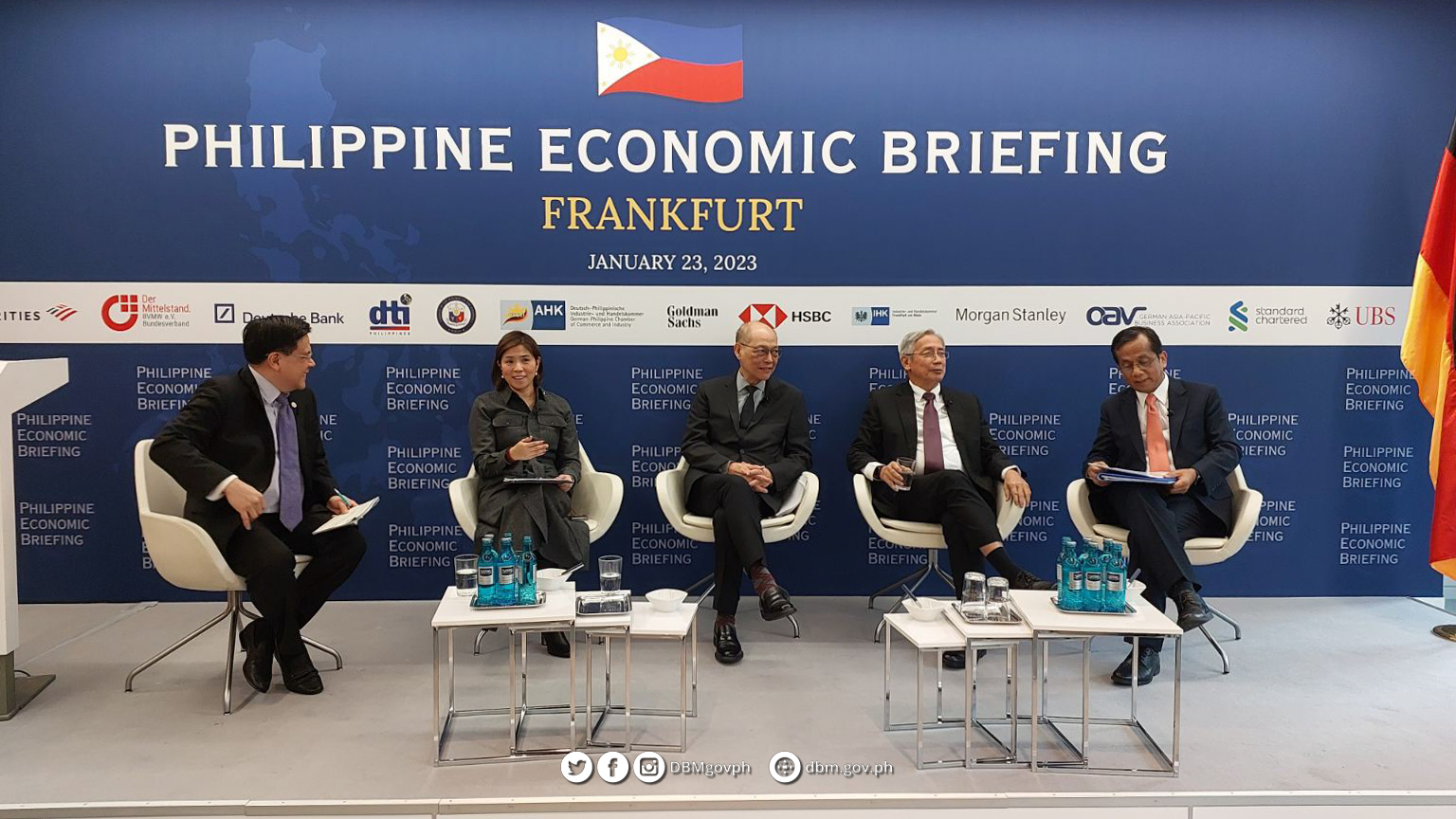
Ladies and gentlemen, good morning.
First, I would like to thank the Philippine Embassy, Deutsch Bank, and other partners for hosting us and allowing us to share our insights on the Philippine economy, the FY 2023 national budget, and important updates on the structural reform initiatives of the Marcos Jr. administration in pursuit of its Agenda for Prosperity.
Let me also share a common observation that we’ve seen the past days: optimism about the Philippine economy. This is not without basis. Businesses, consumers, and the government all agree that the Philippines is on track towards strong recovery. But we are also aware of the continued external challenges to recovery and economic transformation. Hence, we have prepared and designed our policies and programs to address these.
Let me share with you an overview of the Fiscal Year 2023 General Appropriations Act. The National Budget of the Philippines amounts to Php 5.268 trillion or USD 94.82 billion. It is 4.9 percent higher than last year's budget, and is equivalent to 22.2 percent of the country's GDP.
Framed by the 8-Point Socioeconomic Agenda of President Ferdinand R. Marcos Jr. and supporting the Philippine Development Plan (PDP) 2023 to 2028, this budget will lay the groundwork for our agenda for prosperity: to build an inclusive and sustainable economy where no Filipino is left behind.
We are determined to ensure food security to improve agricultural productivity and the re-establishment of the Philippines as a top exporter of agricultural products. Thus, the agriculture budget has received a boost of more than 40 percent of its previous year’s allocation, with Php 173.6 billion (USD 3.12 billion). Of this amount, over Php 42.0 billion (USD 771.1 million) is set to improve the production of agricultural commodities including rice. There are also other programs for farm-to-market and farm-to-mill roads, as well as agricultural machinery, equipment, and facilities.
To make the Philippines an investment destination, we need to create the environment for it. Hence, we are keen on building better and more public infrastructure, digital infrastructure, and social infrastructure. The budget prioritizes infrastructure as a vital element in economic transformation. To achieve this, the government is projecting infrastructure spending to remain between 5.0 percent to 6.0 percent of GDP over the next six years. And to improve transportation in the Philippines in line with the Administration’s Build, Better, More Program, the Department of Transportation is allotted USD 1.91 billion. This represents a 40 percent increase from its previous year’s allocation.
Meanwhile, as we acknowledge the importance of sustainable economic growth, the government has also invested in renewable energy infrastructure and alternative resources that will contribute to sustainable development. Thus, the Department of Energy will receive USD 6.0 million for its Renewable Energy Development Program, Energy Efficiency and Conservation Program, and Alternative Fuels and Technologies Program.
Furthermore, mobilizing resources that enhance resilience and promote low-carbon development is a key agenda of the government. In pursuit of this, the budget for climate change adaptation and mitigation may reach Php 453.11 billion or USD 8.16 billion in 2023, equivalent to 8.6 percent of the total budget. This is significantly higher by 56.4 percent than the previous year’s allocation.
To fully attain the PDP objective to foster enabling environments encompassing institutions, public investments are being made to expand and improve digital infrastructure to ensure a technology-enabled workforce and improve governance.
As mandated by the Philippine Constitution, education remains our number one budget priority with an allocation of USD 16.13 billion.
And in line with the commitment to strengthen our healthcare system following the pandemic, the Health Department has one of the biggest increases in the budget with an allocation of USD 5.66 billion.
To ensure that our Agenda for Prosperity covers every Filipino family, the national budget also prioritizes the reinforcement of social protection with some USD 3.59 billion.
The Budget Department wants to ensure the longevity and continuity of all these programs, so we have set in place legislative and budget reforms to safeguard the integrity of our budget process. Foremost of which is the Progressive Budgeting for Better and Modernized Governance or the PBBM Governance Bill which seeks to institutionalize key Public Financial Management (PFM) reforms. This will be a landmark law that will uphold fiscal responsibility principles, institutionalize cash budgeting system, strengthen oversight of our Bureau of the Treasury (BTr), and strengthen Congress’s power of the purse while embedding public participation in our decision-making.
Through these efforts and initiatives, we aspire to provide every Filipino a fighting chance to manage life’s uncertainties and achieve their full potential. We are working towards economic transformation that would be felt by every individual, family, and business in the Philippines.
We hope you will join us in our journey towards economic transformation by investing in the Philippines. On our part, we are providing investors with a conducive regulatory environment to make your time and investments in the Philippines worthwhile. Let us be partners in pursuit of economic transformation and our agenda for prosperity.
Maraming salamat, thank you, and mabuhay!
###

